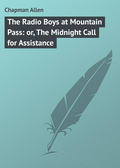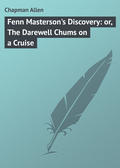
Chapman Allen
Tom Fairfield at Sea: or, The Wreck of the Silver Star
CHAPTER IX
TOM GOES OVERBOARD
“Stand by to lower the boats! Order all hands on deck! Women and children first!”
Captain Steerit was yelling these commands through a megaphone to his crew, even while he turned to order the first mate, on the bridge with him, to go below to the engine room, and see what damage had been done.
The Silver Star, after the first staggering blow, had come to a stop, and lay pitching and tossing on the waves. Clearly her engines were motionless, for Tom missed the vibration that had told of their ceaseless revolutions.
“Something bad has happened,” reflected our hero. “I’ve got to be on the lookout.”
He glanced over the rail, and could see nothing but the black, rushing waves. He had half a mind to go back to his cabin, and see if he could not crowd some of his belongings into a valise.
“If we’ve got to take to the boats,” he reflected, “there are not so many of us but what we can each take a little baggage. I’ll need some other clothing if we come out of this safely. I’ll take a chance.”
He was about to go below when he once more felt the throb of the engines, and the ship quivered.
“We’re under way again,” he said, half aloud. “I guess it’s all right. We may have hit a floating spar, or something like that. And yet, from the way the lookout yelled, it seemed to be more dangerous than that. I guess it’s all right, though.”
But the order to stand by to lower the boats had not been recalled, and already the sailors were swarming about them, seeing that the falls were clear, and that food and water were on board the small craft.
Small craft, indeed, they seemed, to be trusted on the mighty ocean in a storm, and yet they were staunchly made, and Tom knew that if they could be successfully launched they could weather many a blow.
“Well, if I’ve got to take a chance, I’ve got to,” he reflected. “I’ll get some of my things, and wait for my place in the boat.”
The sound of crying and tearful exclamations could now be heard above the roar of the gale, and Tom recognized the voice of Jackie Case, the little boy whom he had saved.
“Poor little chap!” he mused. “It’s tough on the women and children.”
After that first staggering blow, and the confusion that followed, order seemed to come out of chaos. Captain Steerit had matters well in hand, and he issued his orders calmly. The women were comforted as best they could, and urged to get in the small boats. Some objected, fearing to trust themselves to the craft in such a storm. But the captain insisted.
“Is there really any danger?” asked Mr. Blake, as he stood by one of the starboard boats, his wife clinging to him. Tom was near enough to hear the captain’s answer.
“We have sprung several bad leaks,” was what the commander said, “and the pumps can’t keep the water down. We must have struck a half-submerged wreck, and that further opened the seams which were started by the strain of the storm. I regret to say it, but I fear we must abandon the ship – before it is – too late!”
His solemn words set the women to weeping again, but their relatives tried to calm them. Tom had started for his stateroom, intending to get some of his belongings, when little Jackie spied him.
“Tom! Tom!” he called. “Come with me.”
“In a little while, Jackie, my boy!” Tom answered. “I’ll get in after you do.”
“Come with me and my papa,” invited the little lad, and he started to run across the heaving deck, but his parent caught him up in his arms and hugged him close.
The engines that had started up, after a temporary stoppage caused by the collision, again suddenly ceased to work, and once more the Silver Star lay at the mercy of the wind and waves. It was raining now, and the storm was at its height, the wind whipping the stinging drops into the faces of everyone.
“Hurry, men!” urged the captain. “Get them into the boat and follow yourselves. Where are you going, Tom?” he asked, for the commander had come down from the bridge.
“To my cabin to get some of my things,” answered the lad.
“Better not. We’ll have to be quick! She’s beginning to settle. She won’t last much longer! There must be a big hole ripped in her. What’s the matter with those signal lights?” he cried.
“Aye, aye, sir!” came the answer, and a moment later there flared up the glare of the rockets that might serve to call help to the stricken vessel. The wireless, too, was crackling out an appeal, but this did not last long, as the dynamo was soon put out of commission, and the storage battery did not seem to work.
“Well, I guess we’ve got to go,” mused Tom. “This is certainly a bad start toward the rescue of dad and mother!” and he felt a mist of tears come into his eyes, that mingled with the rain and the salty spray of the sea.
“Are all the women and children in?” asked the captain, for one boat would more than serve to hold them.
“Aye, aye, sir!” came the answer.
“Then let their husbands or other relatives join them.”
The men involved in this order moved forward over the sloping and heaving deck, in the glare of the signal fires, and took their places.
“Tom! Tom Fairfield!” cried little Jackie. “I want you with me!”
“Yes, Tom, you might as well go,” said the captain, holding out his hand to our hero. “Good-by.”
“But, aren’t you coming? There’s lots of room.”
“I’ll come – last,” was the grim answer. “Go! And good-luck to you. I’ve put a trusty man in charge of that boat.”
Our hero sprang toward the lifeboat which was all ready to be lowered at a favorable moment. But Tom Fairfield was not destined to enter her.
At that moment, and with a suddenness that took them all unprepared, there came another frightful blow against the side of the ill-fated Silver Star. She heeled over, and in such a manner that the lifeboat with its load of shrieking women and pale-faced men overhung the sea.
“Lower away!” shouted some one.
“Wait!” cried Captain Steerit.
Tom felt himself knocked down and hurled across the sloping deck. In vain he tried to grasp something to stay his progress. A wave splashed up, making the deck even more slippery.
Over and over rolled Tom, and he hoped, when he came to the rail, to save himself. But the rail was not there. In the glare of the burning signal lights Tom could see where a great portion of it and the netting had been torn away. There was nothing to save him from rolling into the sea.
In vain he tried to clutch the slippery deck, to hold on to something. He did not cry for help. He knew it would be useless. Over and over he rolled.
The vessel was sinking fast now. Tom, imperiled as he was, could tell that. She rose more sluggishly to the heaving waves. There were cries of pain, terror and confused shouts.
A moment later our hero found himself shooting off into space.
Down and down he plunged. He could see the glare of the rockets reflected from the surface of the boiling waves. He saw something white floating, and he tried to hurl himself toward that.
In another instant he had hit the water feet first, and felt himself going down into the depths. He had been tossed overboard into the midst of the ocean and in the heart of the storm. The waters closed over him, and filled his ears with their booming sound.
CHAPTER X
THE DERELICT
“Air!” thought Tom gaspingly, as he went down and down into the depths. “I must get air! My lungs! They’re bursting!”
He felt himself being buffeted by the waters. It seemed as though he was in a whirlpool of foam. He was being sucked down.
Even then he found himself thinking of many things besides the very evident necessity of saving himself. He was wondering what had struck the Silver Star. He wondered if the ship had gone down, or had gone to pieces. What had become of her passengers and crew?
And, with all that, and with the vital necessity of getting a breath of air soon, Tom found himself regretting that his mission to rescue his parents must now fail.
“But it shan’t!” he found himself exclaiming mentally. “I’ll get up and save myself, and them too!”
Tom had grit. It was the kind of grit that enabled him to win the football game, and to lead his class to revolt against unfair treatment.
Striking out with all his might our hero swam upward. He felt that he would never reach the top so that he might fill his lungs with air, and he blessed his lucky stars that he had put on light clothing, soft shoes and was not encumbered with anything.
For he felt that he was mounting upward. Upward through the blackness and dark waters to what?
That was something that even he dared not think about. Would he find himself on a waste of waters, or would there be some boat near to save him? Had the whole ship’s company perished? It seemed likely.
Then, as suddenly as he had gone into the water, he felt himself shooting up out of it. He shook his head, as a dog shakes his body on emerging from the waves, to free his eyes of water. Then he glanced about.
There was a glare on the storm-swept surface of the heaving sea, a glare that Tom knew came from the flaring rockets and signal lights. He whirled about in the water until he could face the source of the illumination, and he saw that which saddened and startled him.
About a hundred yards away, for that distance she had been swept by the storm, was all that was left of the Silver Star. She was low in the water – a wreck – and the light flared from one of her signal masts, where a sailor had fastened it.
And in the glare Tom saw something else. It was a lifeboat, filled with people, and it was headed away from him. He knew this was his one chance. Treading water, so as to bring his head as much above the waves as possible, he shouted:
“Help! Help! I’m Tom Fairfield! I’m right astern of you. Help! Help! I’m – ”
His voice was drowned out in a smother of foam that broke over him from a huge wave, and he had to swim to keep himself up. The boat disappeared behind the crest of a comber, only to reappear again, the dying flare from the light showing the men rowing hard.
“Help! Help!” sang out Tom again, but at the same moment he realized that in the roar of the wind and the swish of the waves his cry could scarcely be heard. Still he called again:
“Help! Help!”
Once more he was covered by a smother of foam, and again he had to swim with all his strength. When he could see the lifeboat again it was farther off, and then Tom did what he should have tried at first – he endeavored to swim after it.
“For they’re rowing to get beyond the suction of the ship when it goes down,” he reflected, “and when they’re far enough away they’ll wait to pick up survivors.”
He struck out valiantly, his courage coming back to him now. It was not cold, and save for the violence of the wind and waves, Tom would not have been in bad straits, for he was a good swimmer. But he realized the peril of his situation – adrift on the open ocean.
He had swum perhaps fifty feet, getting occasional glimpses of the lifeboat as it rose on the crest of a wave, when the flare on the vessel seemed to be dying down.
Tom swung around and saw a weird and terrifying sight. As he looked the Silver Star seemed to stand up on end, like some stricken animal making a last stand. Then with a suddenness that was startling, the craft sank from sight, a loud boom proclaiming when the decks blew up from the compressed air under them.
Instantly the sea was in blackness again, and Tom felt his heart sinking, as he realized that he could no longer see the lifeboat, upon which his sole hope could be placed.
“But I’m not going to give up. I’ll yell some more,” he thought, and he called with all the power of his lungs.
“Help! Help! I’m Tom Fairfield! Right astern of you!”
He listened, but all he could hear was the roar of the wind and the swish of the waves. And then he knew it was hopeless to look for aid from that direction.
“I’ll keep afloat as long as possible,” he thought “and then – well – ” He did not like to think further. “In the morning though,” he reflected, “Ah, in the morning I may be able to pick up enough floating wreckage to make a raft, or the boat may see me. There must be more than one boat. They had time to launch more than one when I started to make my roll into the ocean.”
This thought gave him courage, and he struck out with a better heart, determining not to give up as long as he could keep afloat.
“I wonder if there are sharks here,” thought the shipwrecked lad. “Sharks! Ugh! And other big fish!”
He felt a shiver run through him in spite of the warmth of those southern waters, and the very warmth, and the thought of how far south he had come, made him think all the more about some fierce man-eating tiger of the sea.
“Oh, pshaw! What’s the use of being a chump!” said Tom aloud, when he got a chance to free his mouth of salt water. “I just won’t think of anything like that. Of course there aren’t any sharks here. I’ll just think that I’m trying to win the swimming race at Elmwood Hall for my Freshman class.”
The very idea, thus simply expressed, made him feel better, and he struck out with better heart. Once more he went over in his mind the events that had preceded the sinking of the Silver Star and the necessity for her passengers and crew to put to sea in small boats. He found himself wondering what she could have hit, or been rammed by, to tear a hole in her.
“And my pictures of the waterspout!” reflected Tom grimly. “They’re at the bottom of the ocean by this time I suppose. And poor dad and mother – But there, I’m not going to worry. I’ve got to swim, and I guess I’ll get all I want of it, even though I am fond of water.”
All around him was blackness, save a slight phosphorescence of the ocean, and when he came up on the crest of a wave he looked about for a possible sight of a boat. But he saw nothing. He shouted occasionally, but he realized that he was only wasting his breath. On he swam, grimly and determinedly.
The storm seemed to be no worse, and Tom even found himself thinking that it was abating, after it had done all the damage possible.
There came a big wave over him, almost depriving him of breath, and sending him rolling and tumbling down into the depths again. When he came up, and had filled his lungs with air, he was almost exhausted.
When he struck out his right hand hit something in the water. Instinctively he shrank away with a start of fear that he had come in contact with some monstrous fish. Then a flash of lightning – the first since the beginning of the storm – revealed to him a large cork ring, or life preserver.
He could barely repress a shout of joy – only the thought that his mouth might become filled with salt water deterred him, for he knew what that ring meant to him.
“I can get that over my head and float,” he reasoned. He reached for it. The swell carried it away from him for a moment, and then he got hold of it. In a moment he had it under his armpits and he was riding easily on the surface of the sea, for the ring was a specially large one, and raised him well up.
He was floating on the surface of the sea, I have said, and yet it was not like the comparatively smooth surface of a river or lake. For, so large were the waves still, in spite of the fact that the storm was a little less severe, that Tom was down in a deep valley one moment, and on a wave-crest the next.
“Perhaps I can see the boat, now that there’s lightning,” he reasoned, and, each time he came up he looked about. But he could see no sign of the life-craft, nor were his shouts answered.
He swam on again, rather hampered as to speed because of the ring, but he did not mind this. His chief aim was to keep alive and afloat until morning so that he might look for help, or be located by those in the boats, if they were still on top of the sea. So Tom floated idly on, occasionally swimming when he felt a bit numbed by the cold, which he was conscious of, now that he had been in the water so long.
The lightning increased in frequency and intensity, and there were mutterings of thunder.
“In for another storm, and a different kind,” mused Tom. “I hope it clears up after that, so I have some chance.”
The flashes became more brilliant, as the storm came nearer. Tom took advantage of every one of them to look for a boat, or for a piece of wreckage to which he might cling. But he saw nothing. Then the rain, which had ceased for a time, burst with greater fury. It fairly seemed to beat down the crests of the waves, and Tom was glad of that.
“And I can get a drink, too,” he reflected, for he had swallowed some salt water, and his throat was parched. He held open his mouth and the grateful drops dashed in. The amount he was able to catch was rather disappointing, but it was better than nothing.
And then, as the fury of the storm grew, and the lightning became even more intense, Tom saw something that made his heart beat high with hope.
It was a shape of something lying low in the water, and moving sluggishly on the swell. Our hero had only a glimpse of it at almost the tail-end of the lightning flash, and he waited for another illumination before deciding what the object was.
Then the whole heavens seemed lighted up by a great flash and our hero saw the object again.
“A boat!” he cried. “And some one in it.”
He whirled about in the water, headed for the object, and struck out.
“Help! Help!” he cried again. “Wait for me.”
Back came the answer over the waste of waters.
“We can’t do anything but wait. Swim over here. Go by the lightning.”
Once more Tom saw what he thought was the boat, by the glare of a flash. Then its peculiar shape impressed him.
“It’s an upset boat!” he gasped. “They’ve been thrown out and are clinging to the bottom. But it’s a big one, though. Much bigger than any of the lifeboats. I wonder what it can be?”
On he swam toward the craft.
“Are you there?” came a hail.
“Yes, I’m coming,” Tom answered.
A huge wave seemed to sweep him onward. He saw that he was close to the wrecked boat. A few more strokes, and a hand was reached out to him. He grasped it desperately.
“Come aboard, mate!” a hearty voice sang out. “We haven’t much, but you’re welcome to it. Come aboard!”
Tom found himself scrambling up the side of some craft. In the next flash he saw the forms and indistinct faces of two men. One of them held something in his arms.
“What are you on?” gasped Tom.
“A partly submerged derelict,” was the answer. “It’s the one the Silver Star struck, I reckon, and the thing that ripped a hole in her and sunk her. It’s a big derelict, my lad,” the sailor went on, “and when we were tossed overboard we landed close to it, same as this other little chap did.”
“What other little chap?” asked Tom, as he sank down exhausted on the deck of the derelict.
He had his answer a moment later.
“Oh, Tom. Tom Fairfield!” a childish voice cried. “I want you and I want my daddy!”
CHAPTER XI
ANOTHER PASSENGER
For a moment Tom did not move from the position into which he had fallen when he clambered aboard the derelict. He was exhausted, but, more than this, he was startled by the sound of the childish voice. And yet, in an instant, he knew who had called his name.
“Is – is he here – little Jackie here?” Tom gasped.
“That’s what he is, matie,” answered one of the men. “I’ve been holding him ever since we picked him out of the wreck of a lifeboat, poor little chap. But I guess he’d rather come to you.”
“Tom – Tom Fairfield I want you!” cried Jackie. “Where is my daddy?”
Tom felt a lump come into his throat, but he rose up and answered as best he could.
“I – I’ll take care of you now, Jackie,” said Tom brokenly. “Daddy – I – I guess your daddy is off somewhere in a boat, looking for you. He’ll row up in the morning, and won’t he be surprised when he sees you here ahead of him? Oh, won’t we have a grand joke on him, though!”
Jackie laughed – laughed amid that waste of waters on the wave-washed derelict.
“Oh, how nice, Tom!” he said. “I want you to hold me, and tell me about how daddy will be surprised.”
“Poor little kid,” murmured the sailor who held the little boy, as he passed him over to Tom when a lightning flash came.
Tom was now getting his strength and wind back after his long swim. He was still soaking wet, but the rain had now ceased, and the wind was warm. If the sea went down enough so that the waves would not wash up over the derelict they might all get dry. And then the morning would come. But what would it bring?
Tom gathered Jackie in his arms, and the boy, with a contented sigh, snuggled up to our hero’s shoulders.
“Now tell me about daddy,” he commanded. “Tell me about the joke on him.”
Tom started to comply, forcing himself to make a joke out of what he feared would be a grim discovery in the daylight. The boy’s father was probably among those drowned when the ship foundered. But little Jackie must not know it. So Tom made up a fanciful little story – telling it while the lightning flashed and the thunder rumbled, and while the derelict rose and fell on the long swells.
“Move back here, mate,” said one of the sailors in a low voice. “It’s higher, and more out of the water.”
He moved forward to make a place for Tom, and the lad noticed that the man took a position where he would be more exposed to the waves than at first.
“But you – ” began Tom with an objection.
“Come on,” ordered the man, half harshly. “You want to keep the kid dry; don’t you?”
Then Tom understood, and with a grateful heart he moved up so that Jackie would not be so wet. The little fellow was breathing heavily now, and Tom knew that he was asleep.
“Well, Tom Fairfield,” remarked one of the sailors, “this is tough luck, isn’t it?”
“Couldn’t be much worse, and yet there’s lots worse off then we are,” commented the other.
Tom looked at the sailors as the lightning flashed again. One he knew as Abe Fordam, and the other was Joe Weldon. They had been deck helpers, cargo shifters – doing any of the many things required on a steamer, and hardly sailors proper, for there were no sails to manipulate. Tom had made their acquaintance when he had requested them to pose for their pictures as they were coiling up an anchor chain one day on deck.
“How did you happen to get aboard this derelict?” he asked, getting into as comfortable a position as possible with his little burden.
“It sort of – happened,” replied Abe.
“We had lowered away the main lifeboat, with most of the passengers in it,” added Joe, “right after the second crash came, and then there wasn’t time to do much more. It was everyone for himself. Some of the men were cowards, too,” he added contemptuously.
“That’s what they were,” growled Abe. “They swamped one boat by all trying to crowd into her. Me and Joe here shifted for ourselves, and got aboard a life-raft that we slid down the sloping deck. We were better off than most, too.”
“But how did you get aboard this derelict?” asked Tom.
“Our raft hit it, after we’d been afloat some time, and I says to Joe that we’d better take to it, seeing as how it was bigger than the raft. So we transferred our keg of water to it, and what little grub we had, and climbed on.”
“Then we found the boy,” supplemented Joe.
“That’s right, then we found the boy,” agreed Abe. “I see something awash near the bow of this old craft, and I made a grab for it, thinking it might be more grub. But it wasn’t. It was part of a lifeboat, with some life preservers jammed under the thwart. I pulled it up, and there was this kid, sort of fastened by the life preserver straps. At first I thought he was gone, but I listened close, and heard his breathing.
“We got the water out of him, as best we could, and then he began to cry. He cried for his daddy something pitiful, and nobody knows where his daddy is,” he added softly.
“Then he called for Tom Fairfield,” added Joe.
“Yes,” assented Abe, “he cried for you. And it seems sort of Providential-like that you should come swimming along. How did you do it, Tom?”
“It just happened. I rolled off the deck when the second crash came, and, when I came up I swam for it. I called for help as I saw a lifeboat rowing away, but they didn’t hear me. Then I swam until I got this life-ring, and then – well I saw the derelict and made for that.”
“And it’s a good thing you did,” commented Joe. “For Abe nor I don’t know the first thing about taking care of kids. I’m glad you come.”
“So am I,” grunted Abe.
“What sort of a craft are we on?” asked Tom.
“A derelict lumber ship, as near as I can make out,” replied Abe. “Them kind floats longest and they’re the very worst sort of derelicts for a ship to hit, for they’re so heavy – almost solid, you might say. This is what the Silver Star hit, I’m almost positive. First we hit her a light blow, and then we sort of fended off. The engines got out of commission, and something went wrong with the steering gear, I guess. Then we fetched up with another whack at it, and that finished us.”
“That’s it,” agreed Joe. “But it ain’t a bad sort of craft to float on when you’ve been wrecked. It’s better than the life-raft.”
“Will it float long?” asked Tom.
“As long as we need it – maybe longer,” spoke Abe, and his voice was rather gloomy.
“Have you any water, and enough food to – to last for some time?” asked Tom.
“Not an awful lot,” murmured Joe. “There’s water enough for four days, maybe, if we don’t take too much, and some tinned meat and biscuits in the case we put on the raft. Why, are you hungry, Tom?”
“No, oh, no, not at all. I was just thinking ahead. There are four of us, counting little Jackie.”
“And he’ll get his share, along with the rest of us, matie,” said Abe quickly. “It’ll be share and share alike, until the last crumb and drop is gone.”
“That’s what,” growled his companion.
“Are there any chances of us being picked up?” Tom inquired.
“Oh, yes, plenty of chances,” answered Abe. “But you can’t tell how long it will be before that happens. Still we can’t do anything but wait.”
“Maybe one of the lifeboats will sight us,” suggested our hero, as he moved a bit so that Jackie would rest easier.
“Maybe, but hardly. They’ll probably row toward the nearest land,” suggested Joe.
“And where might that be?” inquired Tom.
“Well, we were about three days from the Hawaiian Islands, at the rate we were going in the Silver Star,” went on Joe, “but in the storm I guess we were pretty well blown out of our course. Probably now we’re some distance to the east of ’em now, and maybe below ’em, for all I can tell. But if we can make a southwest course we’re bound to fetch up at some island sooner or later, if we’re not picked up by some vessel in the meanwhile.”
“Oh, then we’re not so badly off,” commented Tom.
“It might be worse,” agreed Joe. “Well, the storm’s over, and it’ll soon be daylight I reckon.”
The lightning had ceased, and the thunder was only distantly rumbling. It was quite dark, and the derelict drifted on with its passengers staring moodily out into the blackness – all but Jackie, who was in happy dreamland.
“There’s the sun,” announced Joe, after a pause. He pointed to where a faint light showed in the east. It gradually grew until the red ball of fire seemed to pop up from the ocean.
Jackie awoke, and sat up in Tom’s arms.
“Did daddy come yet?” he asked.
“Not yet,” replied our hero softly. “But he may – soon.”
“And he’ll be s’prised to see me here; won’t he?”
“Yes, Jackie.”
Tom looked at the craft on which he now was. As the sailors had surmised, it was a derelict lumber ship, and one end of it was well out of the water.
Tom was just wondering how they could improve their situation by making a sort of shelter and platform from some of the lumber when Joe cried out:
“Look! Look over there! It’s a boat, or part of one!”
They looked to where he pointed. There, drifting slowly toward them was a wrecked lifeboat, one of those that had been carried on the Silver Star.
“If we can only get her, she may have food and water in,” suggested Joe. “I’m going to swim for it, and tow it in. I see a rope trailing from the bow.”
Before they could object he had leaped off the derelict and was swimming toward the boat as it rose and fell on the wash of the sea. Joe was strong, and a good swimmer, and soon he was aboard again with the end of the line. By it they hauled in the boat.
“Anything in it?” asked Abe.
“I didn’t stop to look. Just grabbed the line and turned back.”
Now the boat was alongside. Tom looked into it and uttered a cry of surprise. It contained one passenger – a man, and it was the same mysterious man who had kept himself hidden in his stateroom aboard the Silver Star.







